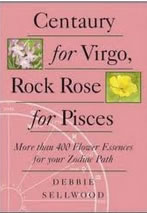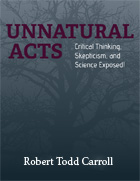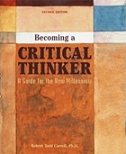From Abracadabra to Zombies
The Skeptic's Dictionary Newsletter
Volume 12 No. 7
July 2013
"...the state of skepticism is essentially static." --Dean Radin
What's New?
Not much! Updates on inattentional blindness, inedia, and electrosensitivity.
Meditation: What's in it for Me?
There are so many studies touting the benefits of meditation it can make your eyeballs swim. Just last month a study was published in a medical journal that found meditation "may be beneficial for postmenopausal insomnia." In another study
a research team from Massachusetts General Hospital looked at the brain scans of 16 people before and after they participated in an eight-week course in mindfulness meditation. The study, published in the January issue of Psychiatry Research: Neuroimaging, concluded that after completing the course, parts of the participants' brains associated with compassion and self-awareness grew, and parts associated with stress shrank.*
I know. Pretty small study and change in size may not be an indication of anything important.
Several scientists believe they have strong evidence that meditation makes people nicer. Hmm. You and I might benefit if others meditate. If so, we should encourage everybody else to meditate. We might then reap the benefits of their compassion as we rob them blind. :)
A recent study published in Psychological Science is titled "Meditation increases compassionate responses to suffering." The evidence?
We recruited 39 people from the Boston area who were willing to take part in an eight-week course on meditation (and who had never taken any such course before). We then randomly assigned 20 of them to take part in weekly meditation classes, which also required them to practice at home using guided recordings. The remaining 19 were told that they had been placed on a waiting list for a future course. After the eight-week period of instruction, we invited the participants to the lab for an experiment that purported to examine their memory, attention and related cognitive abilities. But as you might anticipate, what actually interested us was whether those who had been meditating would exhibit greater compassion in the face of suffering. To find out, we staged a situation designed to test the participants’ behavior before they were aware that the experiment had begun. WHEN a participant entered the waiting area for our lab, he (or she) found three chairs, two of which were already occupied. Naturally, he sat in the remaining chair. As he waited, a fourth person, using crutches and wearing a boot for a broken foot, entered the room and audibly sighed in pain as she leaned uncomfortably against a wall. The other two people in the room — who, like the woman on crutches, secretly worked for us — ignored the woman, thus confronting the participant with a moral quandary. Would he act compassionately, giving up his chair for her, or selfishly ignore her plight? The results were striking. Although only 16 percent of the nonmeditators gave up their seats — an admittedly disheartening fact — the proportion rose to 50 percent among those who had meditated. This increase is impressive not solely because it occurred after only eight weeks of meditation, but also because it did so within the context of a situation known to inhibit considerate behavior: witnessing others ignoring a person in distress — what psychologists call the bystander effect — reduces the odds that any single individual will help. Nonetheless, the meditation increased the compassionate response threefold.*
Another small study, I know, but maybe it will lead to further studies that will inspire us to make the world a little better.
Some use meditation to enhance creativity. A small study found that meditation improved memory and increased graduate record verbal exam scores. The Huff & Puff Post claims that you can increase your libido by meditating. A small study found that meditation might help you lose weight. Many believe that meditation can help with anger management. Some believe that meditation can help with depression.
The Huff and Puff Post, while often a source of junk science when it comes to medical matters, occasionally publishes a gem. Such is the case with an article by Willoughby Britton, Ph.D. entitled "Meditation for Sleep: Paradoxes and Promises." Britton writes:
Meditation techniques, including mindfulness, have been found to calm the sympathetic nervous system's "fight or flight response" and decrease worry and rumination -- all the things that interfere with good sleep. But does meditation improve sleep? My first thought was "of course!"
It is easy to find many Google hits promoting the belief that meditation helps one sleep better, but there isn't much science to back up the belief. The cross-sectional studies--those that compare meditators to non-meditators rely mainly on self-reporting. Another problem with such studies is that it's possible the meditators were better sleepers before they started meditating. Longitudinal studies--those that measure sleep quality before and after learning meditation in people who've never meditated before--don't have to rely on self-reporting and if large enough can significantly reduce the possibility that the effect measured existed before the meditation began. Since there is no "fake meditation," the control group in a longitudinal study on meditation usually consists of those told they are on a waiting list.
Britton found that none of the longitudinal studies that have been done used what is considered the "Gold Standard" of sleep research: the polysomnographic sleep study, which measures brainwaves (EEG), eye-movements, and muscle tone overnight in a laboratory. So he did his own study using the gold standard. He found three things of interest: filling out daily sleep diaries (but not meditating) was just as beneficial for sleep as meditation; "meditation was associated with several indices of increased wakefulness and decreased sleep propensity, including more awakenings and stage one sleep (a lighter stage of sleep) and less stage three and four or 'slow-wave sleep' (a deeper stage of sleep) compared to controls;" and "the more one meditated, the more awake one's brain became." Still, I wouldn't draw any grand conclusions from his study, which was rather small and restricted. "Twenty-six medication-free individuals with a history of depression were randomized into either an eight-week mindfulness meditation program called 'Mindfulness-based Cognitive Therapy' or a wait-list control condition."
The American Heart Association had some of their people review the published research on meditation (and other "alternatives to pills") as an aid to lowering blood pressure (BP). They found that meditation and other relaxation therapies "generally had modest, mixed, or no consistent" efficacy. Also:
The mechanism whereby meditation techniques lower BP when it occurs remains unclear. It has been suggested that the mechanisms may lead to reductions in stress and physiological arousal, thereby producing favorable effects on the autonomic nervous system balance. Further studies are needed to clarify the importance of this and other possible biological pathways.
The reviewers found a similar lack of strong evidence for yoga and biofeedback as a reliable means of lowering blood pressure.
At this point, I guess what I'd like to see is a comparison of meditation groups to groups who engage in other relaxation techniques such as watching fish in a tank, doing needlepoint, or performing some mindless task on an assembly line. The possible kinds of studies are endless and could go on for hundreds of years. Anyway, so far as I know, nobody has found harmful effects from meditation. So, if you believe meditating enhances your creativity, compassion, well-being, etc, I see no harm in it as long as you don't do it while driving your car, flying an airplane, or sky diving.
The Great Debate
I've been challenged to a debate by someone identifying himself as "Joe Schmoe." To guarantee that I have not twisted Joe's meaning, here is his unedited email to me:
I love me some lively debate! Would love to have a debate with you on any of the questionable "hoaxes" or "frauds" that you seem to be a specialist in. Can you imagine; a lowly high school drop-out vs the mega mind Phd? WOW, what a spectacle!! Kind of a David vs Goliath. The simpleton vs the Brain. Needs to be a public forum though, so there is no tampering! Viewers will want an unfettered look at comments and counter-points. Should be a cake walk for ya dude. Just come with verifiable Facts, because I have no bias and operate strictly on information that can be substantiated (as much as possible, versus none at all). I am a truth seeker with no agenda. With that big brain of yours, I should be nothing more than a snack! Take me up on my offer, let's find out??!! Just let me know the subject. If I am not well versed in that particular area, I may need up to a week to MASTER it. You have a well put together site, now all you need to do is put away your obviously biased agenda! I see nothing about Medical establishment hoaxes, or am I missing something?! Perhaps it is simply because you do not know the history of the AMA, or the Rockefellar role in turning medicine into a money machine? See, it's what you don't say that speaks volumes! My truth will smoke your prevarications every time. Don't want to debate the obvious or unprovable "myths, legends, or hoaxes" either. Prefer to stick to the subjects where you know that the mass of people won't even bother looking things up to verify whether you are lying, or stretching the truth a bit. Take me up on the challenge, if you dare!!
I guess I'm naive. I thought the pursuit of truth was a cooperative venture, not a game with winners and losers.
Magical Thinking: Heal a Stranger's Knee and Drink Your Shyness Away
Young people in Brisbane, Australia, are flocking to an American faith healer in hopes of becoming healers themselves. Faith healing always has a following, despite the obvious contradiction of seeking health from a being who created a world full of sickness. This being is such a caring "father" that he'll even heal a stranger's ski injury if you pray for it. Imagine, you can become this being's vehicle for healing if you just have faith and are willing to utter a few inane incantations. Talk about a power trip!
 If deluding yourself into thinking that you have healing power doesn't make you feel better, you can always go to the The Victoria Room in Sydney for a cocktail laced with some Bach flower essence. Yes, some wise entrepreneur has figured out that there are drinkers who will pay extra for a bogus homeopathic additive to their cocktails, e.g., mimulus to reduce shyness.
If deluding yourself into thinking that you have healing power doesn't make you feel better, you can always go to the The Victoria Room in Sydney for a cocktail laced with some Bach flower essence. Yes, some wise entrepreneur has figured out that there are drinkers who will pay extra for a bogus homeopathic additive to their cocktails, e.g., mimulus to reduce shyness.
Back in the 1930s Edward Bach proposed that humans suffer from 38 distinct negative emotions. That's the sane part of his belief; the absurd part is that he claimed he could feel "vibrations" from flowers and create diluted potions from the "essence" of the flowers to combat the negative emotions. A clever bar manager is adding drops of Bach's potions to exotic drinks. If you are a procrastinator, you might try the "Peruvian Star," whose ingredients include pisco, fresh pear, anise syrup, lime juice, egg white, and the herbal remedy hornbeam.

To increase the potency of your magic, I suggest you add some astrology to your flower essence therapy, as Debbie Sellwood did. You can read all about it in her classic Centaury for Virgo, Rock Rose for Pisces.
Global Consciousness: Should I Care?
More mail: from someone who says he's been involved in the global consciousness project.
I'm writing in regard to the entry on global consciousness in the Skeptic's Dictionary. I am a research physicist and have co-authored papers with Nelson and Radin. I do not fully share their interpretation of the Project and have more recently been doing independent analyses of the Project. A couple of comments on your dictionary entry. First is that it is very much out-of-date, and as such gives an inaccurate picture. For example, the Lady Diana and Mother Teresa experiments pre-date the GCP and are not part of the formal experiment at all. It's a bit embarrassing (for me, at least) to see the graphs you reproduce in your entry, since I wonder, then, how accurate other entries may be. Second is that a lot has been done in the last 10 years, such as showing that the precognitive suggestions of Nelson and Radin are not supported by the data. Consequently, the entry's discussion of precognitive effects unfortunately becomes a straw-man argument, and as such is misleading. Aside from being outdated, for someone like myself who knows the Project in detail, the entry reads as if it were researched on the Internet, rather than from primary sources, and suffers from the inaccuracies that brings. You make valid points in the entry, and pose good questions. However, the entry has not aged well, and while it is a lot of work to keep dictionaries up to date, your dictionary would benefit from a revised entry on the GCP.
Peter Bancel
Paris, France
Carroll's reply: My entry in The Skeptic's Dictionary is not on the global consciousness project, but on the concept of global consciousness. As Dr. Bancel states, the silly claims about Princess Diana and Mother Teresa antedate the GCP. In fact, they are so silly that I have made the conscious decision not to follow the work of Radin and Nelson on this topic. (Of course, it is possible that my choice was made for me by a cosmic consciousness, but since there is no known plausible mechanism by which this might happen, I'm ignoring it. I won't allow the speculation that it all happens according to some magical mechanism of quantum mechanics.) Anyway, the following is the first paragraph of the Global Consciousness Project page:
When human consciousness becomes coherent and synchronized, the behavior of random systems may change. Quantum event based random number generators (RNGs) produce completely unpredictable sequences of zeroes and ones. But when a great event synchronizes the feelings of millions of people, our network of RNGs becomes subtly structured. The probability is less than one in a billion that the effect is due to chance. The evidence suggests an emerging noosphere, or the unifying field of consciousness described by sages in all cultures.
Anyone familiar with magical thinking, pathological science, the history of psi research, and the work of Dean Radin will find these claims laughable. The reasoning begs the question. The evidence that human consciousness becomes coherent and synchronized is that a "subtle order" can be detected in RNGs by the GCP researchers. The evidence that "subtle order" in RNGs detected by GCP researchers is caused by coherent and synchronized consciousness is what? There is no evidence for this claim. It is an assumption and everything these folks believe about global consciousness hinges on this assumption.
I don't plan to waste my time reading the publications of the GCP folks.
I might add that the GCP page is hosted on the princeton.edu server at http://noosphere.princeton.edu/. A disclaimer on the website notes:
The Institute of Noetic Sciences provides a logistical home for the GCP. It is directed by Roger Nelson from his home office in Princeton, but is not a project of Princeton University.
That's good to know. Princeton suffered enough with the work of Robert Jahn, who also looked for "subtle patterns" in random noise to find proof of psychokinesis.
Finally, one of the founders of the Institute of Noetic Sciences was Edgar Mitchell. Maybe these folks would benefit from a trip to the Victoria Room in Sydney for a homeopathic cocktail and some subtle entanglement.
Written
by Bob Carroll
with the assistance of John Renish
Follow the SD on Facebook and Twitter







